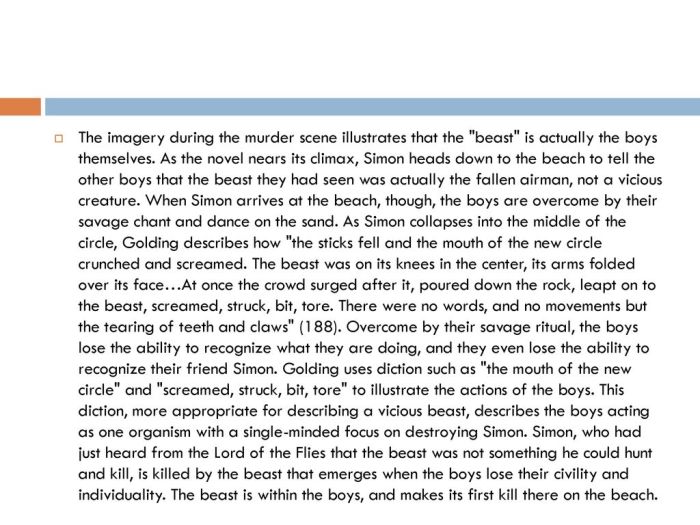Diction in lord of the flies – In William Golding’s Lord of the Flies, diction plays a pivotal role in shaping the narrative, revealing the complexities of characters, setting, and themes.
Golding’s meticulous word choices paint a vivid picture of the island, evoking a sense of place and atmosphere that immerses readers in the boys’ transformative journey.
Diction’s Impact on Characterization
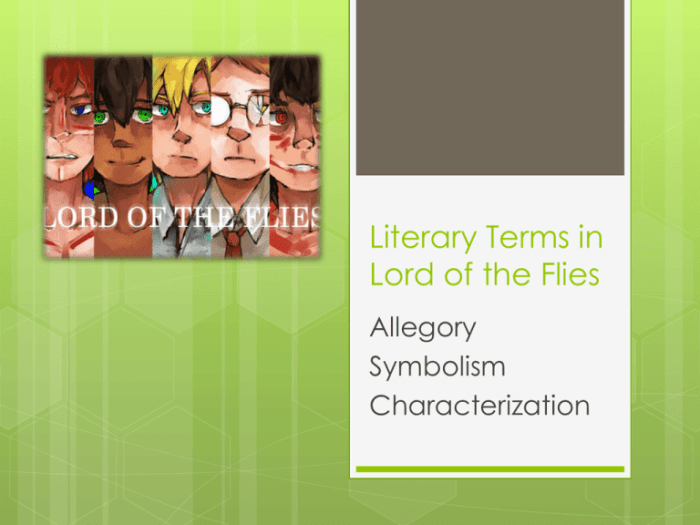
Diction plays a pivotal role in shaping the characters in Lord of the Flies, revealing their personalities, motivations, and relationships through the specific words they choose. William Golding employs a range of diction, from sophisticated language to colloquialisms, to differentiate the characters and their evolving dynamics.
Ralph
Ralph’s diction reflects his leadership qualities and his struggle to maintain order on the island. He often uses formal language, such as “rules” and “democracy,” to assert his authority and promote cooperation. However, as the situation deteriorates, his language becomes more desperate and colloquial, reflecting his growing frustration and the challenges he faces.
Jack
Jack’s diction is characterized by violence and savagery. He uses words like “hunt” and “kill” to express his desire for dominance and his rejection of civilization. His language becomes increasingly primitive as he descends into savagery, mirroring his transformation into a ruthless leader.
Simon
Simon’s diction is marked by its sensitivity and insight. He uses poetic language to describe the island’s beauty and to express his understanding of human nature. His words often carry a mystical or spiritual quality, reflecting his connection to the natural world and his ability to see beyond the superficial.
Piggy
Piggy’s diction is characterized by its intellect and rationality. He uses precise language and logical arguments to advocate for reason and order. His use of scientific terms, such as “hypotenuse” and “catalepsy,” highlights his reliance on knowledge and his belief in the power of science.
Diction and the Setting
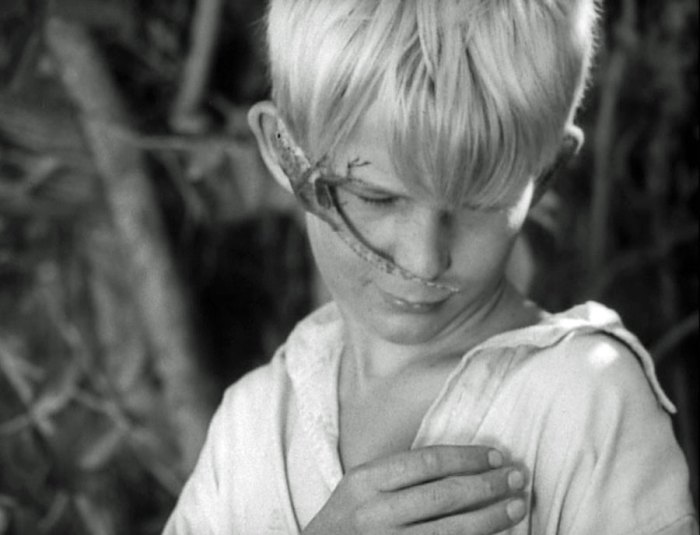
The diction employed in Lord of the Fliesplays a crucial role in establishing the atmosphere and mood of the island. The use of specific words and phrases evokes a vivid sense of place, time, and emotion, immersing the reader in the story’s setting.
Descriptive Language
Golding’s rich use of descriptive language paints a vivid picture of the island’s lush vegetation and pristine beaches. Phrases like “the green canopy of leaves” and “the white beach gleaming in the sun” create a sense of idyllic beauty, contrasting sharply with the darker events that unfold.
Sensory Details
Golding also employs sensory details to evoke a sense of the island’s environment. The reader can hear the “sound of the surf breaking on the coral reef” and smell the “pungent scent of the flowers.” These details immerse the reader in the setting and enhance the emotional impact of the story.
Evolving Environment
As the story progresses, the island’s environment changes, reflecting the deterioration of the boys’ behavior. The once-pristine beaches become littered with garbage, and the lush vegetation is replaced by a “dead forest.” This change in diction mirrors the boys’ loss of innocence and the descent into savagery.
Diction as a Reflection of Social Hierarchy
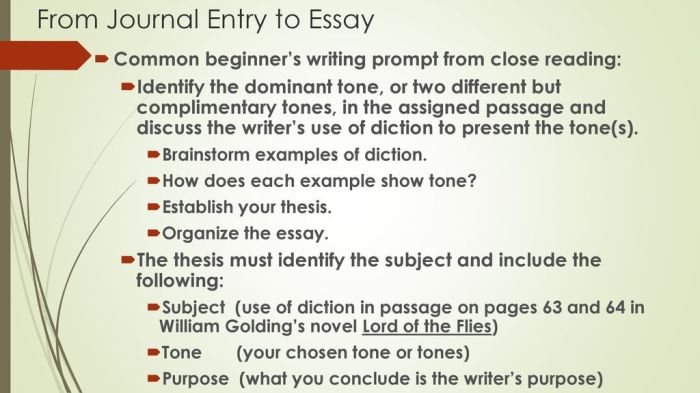
On the island, language becomes a powerful tool that distinguishes between different social groups. Those in positions of power employ sophisticated and formal language, while those of lower status use informal and colloquial speech.
For instance, Ralph, as the elected leader, often speaks in a clear and articulate manner, using precise language to convey his ideas. In contrast, Jack, the leader of the hunters, employs more aggressive and forceful language, reflecting his dominant and assertive nature.
Power Dynamics
The use of language reinforces the power dynamics on the island. Ralph’s formal speech commands respect and establishes his authority, while Jack’s aggressive language intimidates and controls others.
Social Status
Language also reflects social status. The choirboys, for example, use sophisticated and refined language, reflecting their education and upbringing. In contrast, the littluns, who are younger and less experienced, use simpler and more childish language.
Group Identity
Language helps define group identity. The hunters, for instance, adopt a unique vocabulary and jargon that distinguishes them from the other groups. This shared language fosters a sense of belonging and reinforces their identity as a separate entity.
The diction in Lord of the Flies is full of evocative and symbolic language. Take, for instance, the way that William Golding describes the island as a “glistening lagoon” and a “wilderness of thorns.” This language helps to create a vivid and immersive setting for the novel.
Similarly, in the block by romare bearden , the use of bold colors and geometric shapes creates a sense of tension and unease. This tension is reflected in the novel’s themes of violence and savagery.
In conclusion, diction plays a crucial role in reflecting the social hierarchy on the island. The use of language distinguishes between different groups, reinforcing power dynamics, social status, and group identity.
Diction and the Theme of Civilization vs. Savagery
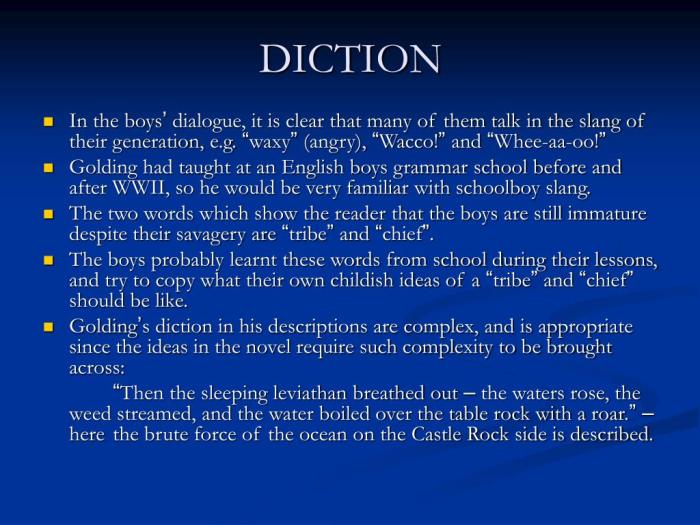
The novel “Lord of the Flies” delves into the conflict between civilization and savagery through the lens of language. The diction employed by the characters reflects their regression or progression towards these opposing states.
Language of Reason and Instinct, Diction in lord of the flies
- Reason:Words like “rational,” “order,” and “law” represent the civilized values that the boys initially strive to uphold.
- Instinct:As savagery takes hold, language becomes more primal, with terms like “kill,” “hunt,” and “feast” reflecting the boys’ descent into barbarism.
Language of Order and Chaos
- Order:The early chapters use structured language, with clear rules and expectations. This reflects the boys’ attempts to establish a civilized society.
- Chaos:As the boys succumb to savagery, language becomes fragmented and chaotic. Exclamations, curses, and incoherent utterances dominate their speech, mirroring the disintegration of their society.
Language of Regression and Progression
- Regression:The boys’ use of pejorative terms, such as “littluns” and “savages,” reveals their growing acceptance of violence and division.
- Progression:Even amidst the chaos, some characters, like Piggy, cling to the language of civilization. Their attempts to maintain order and reason represent the hope for a return to civilization.
Diction and Symbolism
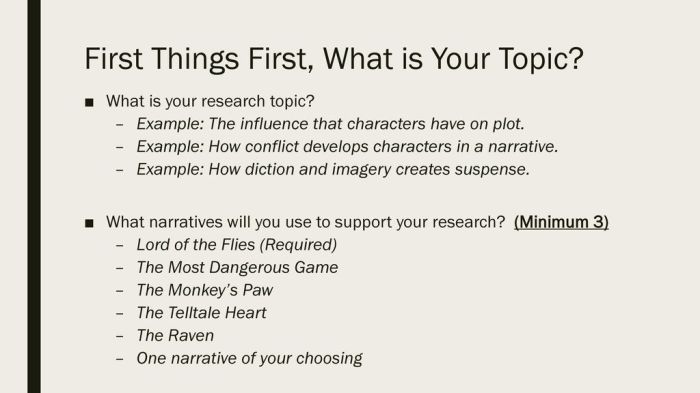
In Lord of the Flies, diction is not only used to create vivid imagery and establish the setting, but it also plays a crucial role in constructing and reinforcing symbols throughout the novel. Specific words and phrases carry deep symbolic meanings, contributing to the overall themes and motifs of the work.
The Conch
The conch shell serves as a powerful symbol of civilization and order on the island. Its clear, resonant sound represents the voice of reason and authority. When the conch is first discovered, it brings a sense of hope and unity to the boys, reminding them of the rules and responsibilities of their former lives.
The Piggy’s Glasses
Piggy’s glasses symbolize both his intelligence and his vulnerability. They represent the power of knowledge and reason, but they also make him a target for the other boys’ bullying. When the glasses are broken, it signifies the loss of hope and the triumph of savagery over civilization.
The Lord of the Flies
The Lord of the Flies, a monstrous pig’s head, represents the primal instincts and the inherent evil that resides within all human beings. It tempts the boys with promises of power and freedom, but it ultimately leads them to destruction.
The Fire
The fire is a complex symbol that represents both the potential for creation and destruction. It provides warmth and comfort, but it also has the power to consume and destroy. The boys’ inability to control the fire reflects their own loss of control and the descent into chaos.
FAQs: Diction In Lord Of The Flies
What is the significance of diction in Lord of the Flies?
Diction is crucial in revealing character traits, establishing the setting, reflecting social hierarchy, exploring the theme of civilization versus savagery, and creating symbolism throughout the novel.
How does diction contribute to characterization in Lord of the Flies?
Specific word choices and phrases unveil characters’ personalities, motivations, and relationships, shaping their development and interactions.
